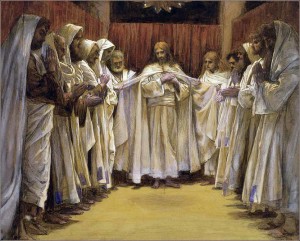 I had an opportunity at my parish 2 weeks ago (8/9/15) to give a talk entitled Praying Like Jesus and the Apostles. The topic arose because I had chanced upon an article entitled Prayer in Jewish Life of the First Century as Background to Early Christians, written by a Jewish Scholar by the name of Asher Finkel, Ph.D. I have had an “unpursued” interest in this topic for the last 20 years, ever since my wife introduced me to the world of Evangelical and Nondenominational Churches. As you may know most prayer among Protestants seems to be unstructured, extemporaneous prayer. In group settings one person says the prayer and others quietly listen, presumably applying that prayer to themselves. Catholics do that also, but more often standard rote prayers are said and the group participates in saying the prayer. In individual prayer, Protestants tend to be conversational in their oral prayer. Catholics may use that method also, but often rely on rote prayers, such as those used in the Rosary or in the Chaplet of Divine Mercy.
I had an opportunity at my parish 2 weeks ago (8/9/15) to give a talk entitled Praying Like Jesus and the Apostles. The topic arose because I had chanced upon an article entitled Prayer in Jewish Life of the First Century as Background to Early Christians, written by a Jewish Scholar by the name of Asher Finkel, Ph.D. I have had an “unpursued” interest in this topic for the last 20 years, ever since my wife introduced me to the world of Evangelical and Nondenominational Churches. As you may know most prayer among Protestants seems to be unstructured, extemporaneous prayer. In group settings one person says the prayer and others quietly listen, presumably applying that prayer to themselves. Catholics do that also, but more often standard rote prayers are said and the group participates in saying the prayer. In individual prayer, Protestants tend to be conversational in their oral prayer. Catholics may use that method also, but often rely on rote prayers, such as those used in the Rosary or in the Chaplet of Divine Mercy.
So I have had to ask myself, which is right? Could I have been saying prayers ineffectively all my life? I know that one of the reasons that Protestants do not like Rote prayer is the fear of mindlessly praying such as occurs in the repetitious babbling of the Pagans which Christ referenced in Matthew 6:7 (“And when you pray, do not keep on babbling like pagans, for they think they will be heard because of their many words”). However, this is a shallow interpretation of the verse. Jesus is saying nothing about rote prayer. Rather, He is talking about a mindless prayer, not an attempt to petition God. And, of course, the one(s) they are praying to, do not exist at all.
There is nothing at all wrong with repetition. Being a good Jew, Jesus would have prayed the Psalms routinely during His life. Psalm 136 repeats the words “for His mercy endures forever” 26 times. In Catholic terms, Psalm 136 is a litany. He also would have been familiar with Daniel 3:52-90 where the phrase “praiseworthy and exalted above all forever” is repeated 27 times. Repetition is not a bad thing. Mindlessness is. The same is true of rote prayers. Jesus would have recited the Shema (Dt 6:4-9) daily amongst other prayers. Saying any prayer mindlessly is always the problem.
And what of liturgical prayer? Jesus also participated in liturgy—just look at the last supper, or observe that he went to Jerusalem three times a year to participate in Passover, the Feast of Weeks, and the Feast of Tabernacles. Jesus believed in Liturgy and taught Paul the specific liturgical words of consecration. Liturgy, on the other hand, is lacking in so many Protestant churches. We also know that Jesus used a conversational style of prayer, such as Jn 11:38-42 when He healed Lazarus.
So to be most like Jesus in our oral prayer, we should use all forms of oral prayer, rote including repetitious prayers such as litanies, rosaries, etc. and also conversational prayers. Catholics really do, do it right.